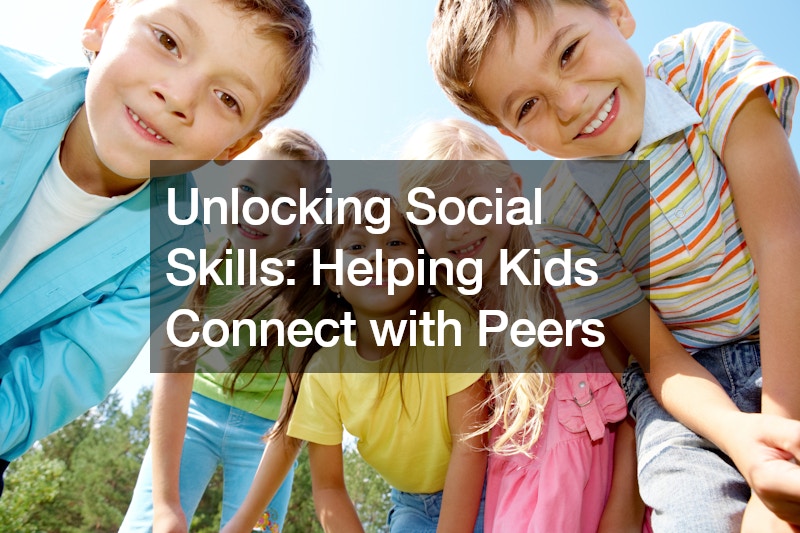
Social interaction is a fundamental aspect of childhood development, yet some children struggle to connect with their peers. As parents, caregivers, and educators, it’s essential to understand the factors influencing children’s social behavior and how we can support them in navigating social interactions effectively. This blog post focuses on practical strategies to help children unlock their social skills and build meaningful connections with their peers.
Understanding Social Dynamics
One of the key insights into children’s social behavior is their preference for interacting with adults over peers. This phenomenon may stem from the predictability and flexibility that adults offer in comparison to their peers.
Children often find adults more accommodating, understanding, and willing to let them lead during playtime. As a result, they may gravitate towards adult interactions, finding them easier to navigate than the unpredictability of peer interactions.
Parents and caregivers can leverage this understanding to create opportunities for children to interact with their peers in supportive environments. By acknowledging the appeal of adult interactions while also encouraging peer engagement, adults can play a crucial role in shaping children’s social experiences. This may involve modeling peer-like behavior during playtime, providing guidance and support as children learn to navigate social dynamics with their peers.
Practical Strategies for Fostering Peer Connections
1. Acting Like a Kid: One effective strategy is for adults to occasionally “put on their kid hat” during playtime. By adopting a more playful and spontaneous approach, adults can create an environment that mimics peer interactions. This may involve taking on the role of a peer during games, allowing children to experience interactions that mirror those with their peers. Through these role-playing scenarios, children can develop a better understanding of peer dynamics and learn to navigate social challenges more effectively.
2. Encouraging Independence: While it’s natural for adults to want to intervene and assist children in social situations, promoting independence is essential for building social skills. Instead of stepping in to resolve conflicts or provide solutions, adults can encourage children to problem-solve and navigate social challenges independently. By letting children advocate for themselves and find their own solutions, adults can help them develop resilience and confidence in social settings.
3. Supporting Inclusive Play: Promoting inclusive play is essential for creating a welcoming environment where all children feel valued and included. Caregivers can actively promote inclusivity by encouraging children to include others in their play and fostering a culture of acceptance and respect. Additionally, caregivers can provide resources and support to help children navigate social interactions and develop friendships across diverse backgrounds and abilities.
4. Promoting Empathy and Understanding: Empathy is a crucial aspect of successful social interactions. Adults can model empathy by actively listening to children’s perspectives and feelings, validating their experiences, and encouraging empathy towards their peers. Through storytelling, role-playing, or discussions about emotions, adults can help children develop empathy and understanding towards others’ feelings and experiences.
Creating Supportive Social Environments
In addition to individual strategies, creating supportive social environments is crucial for fostering peer connections. This involves curating playdates and social opportunities that facilitate positive interactions and mutual understanding among children. When organizing playdates, parents and caregivers can consider the personalities and preferences of the children involved, aiming to match them with peers who share similar interests and communication styles.
Moreover, adults can actively participate in group activities, providing guidance and support while allowing children to interact and problem-solve together. By being present but not overly involved, adults can create a balance that promotes peer engagement while providing a safety net for children to rely on if needed. Through these structured social experiences, children can develop essential social skills such as cooperation, communication, and empathy.
Finally, creating supportive social environments extends beyond individual interactions to include the environment provided by daycare centers. These centers play a crucial role in forming peer connections by offering a conducive space for children to interact and learn from one another. Caregivers in daycare centers can implement strategies similar to those used in playdates, ensuring that children have opportunities to engage in positive interactions and develop essential social skills.
Conclusion: Nurturing Social Growth
Unlocking social skills in children requires a multifaceted approach that addresses both individual behavior and environmental factors. By understanding the dynamics of children’s social interactions and implementing practical strategies, adults can help children connect with their peers and thrive in social settings.
Whether it’s acting like a kid during playtime, encouraging independence, or creating supportive social environments, adults play a crucial role in nurturing children’s social growth. By creating meaningful connections with their peers, children can develop essential social skills that will serve them well throughout their lives.
.

